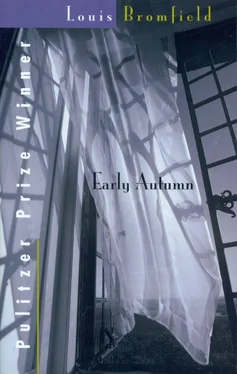Even Aunt Cassie, who distrusted any woman with gaze so bold and free as that set down by the brush of Ingres—even Aunt Cassie could not annihilate the glamour of Savina’s legend. For her there was, too, another, more painful, memory hidden in the knowledge that the parure of pearls and emeralds and all the other jewels which Savina Pentland had wrung from her thrifty husband, lay buried somewhere in the white sand between her bones and those of her cousin. To Aunt Cassie, Savina Pentland seemed more than merely a reckless, extravagant creature. She was an enemy of the Pentland fortune and of all the virtues of the family.
The family portraits were of great value to Anson in compiling his book, for they represented the most complete collection of ancestors existing in all America. From the portrait of the emigrating Pentland, painted in a wooden manner by some traveling painter of tavern signs, to the rather handsome one of John Pentland, painted at middle-age in a pink coat by Sargent, and the rather bad and liverish one of Anson, also by Mr. Sargent, the collection was complete save for two—the weak Jared Pentland who had married Savina, and the Pentland between old John’s father and the clipper ship owner, who had died at twenty-three, a disgraceful thing for any Pentland to have done.
The pictures hung in a neat double row in the lofty hall, arranged chronologically and without respect for lighting, so that the good ones like those by Ingres and Sargent’s picture of old John Pentland and the unfinished Gilbert Stuart of Ashur Pentland hung in obscure shadows, and the bad ones like the tavern sign portrait of the first Pentland were exposed in a glare of brilliant light.
This father of all the family had been painted at the great age of eighty-nine and looked out from his wooden background, a grim, hard-mouthed old fellow with white hair and shrewd eyes set very close together. It was a face such as one might find today among the Plymouth Brethren of some remote, half-forgotten Sussex village, the face of a man notable only for the toughness of his body and the rigidity of a mind which dissented from everything. At the age of eighty-four, he had been cast out for dissension from the church which he had come to regard as his own property.
Next to him hung the portrait of a Pentland who had been a mediocrity and left not even a shadowy legend; and then appeared the insolent, disagreeable face of the Pentland who had ducked eccentric old women for witches and cut off the ears of peace-loving Quakers in the colony founded in “freedom to worship God.”
The third Pentland had been the greatest evangelist of his time, a man who went through New England holding high the torch, exhorting rude village audiences by the coarsest of language to such a pitch of excitement that old women died of apoplexy and young women gave birth to premature children. The sermons which still existed showed him to be a man uncultivated and at times almost illiterate, yet his vast energy had founded a university and his fame as an exhorter and “the flaming sword of the Lord” had traveled to the ignorant and simple-minded brethren of the English backcountry.
The next Pentland was the eldest of the exhorter’s twenty children (by four wives), a man who clearly had departed from his father’s counsels and appeared in his portrait a sensual, fleshly specimen, very fat and almost good-natured, with thick red lips. It was this Pentland who had founded the fortune which gave the family its first step upward in the direction of the gentility which had ended with the figure of Anson bending over “The Pentland Family and the Massachusetts Bay Colony.” He had made a large fortune by equipping privateers and practicing a near-piracy on British merchantmen; and there was, too, a dark rumor (which Anson intended to overlook) that he had made as much as three hundred percent profit on a single shipload of negroes in the African slave trade.
After him there were portraits of two Pentlands who had taken part in the Revolution and then another hiatus of mediocrity, including the gap represented by the missing Jared; and then appeared the Anthony Pentland who increased the fortune enormously in the clipper trade. It was the portrait of a swarthy, powerful man (the first of the dark Pentlands, who could all be traced directly to Savina’s Portuguese blood), painted by a second-rate artist devoted to realism, who had depicted skillfully the warts which marred the distinguished old gentleman. In the picture he stood in the garden before the Pentland house at Durham, with marshes in the background and his prize clipper Semiramis riding, with all sail up, the distant ocean.
Next to him appeared the portrait of old John Pentland’s father—a man of pious expression, dressed all in black, with a high black stock and a wave of luxuriant black hair, the one who had raised the family to really great wealth by contracts for shoes and blankets for the soldiers at Gettysburg and Bull Run and Richmond. After him, gentility had conquered completely, and the Sargent portrait of old John Pentland at middle age showed a man who was master of hounds and led the life of a country gentleman, a man clearly of power and character, whose strength of feature had turned slowly into the bitter hardness of the old man who sat now in the light of Mr. Longfellow’s lamp reading or staring before him into space while his son set down the long history of the family.
The gallery was fascinating to strangers, as the visual record of a family which had never lost any money (save for the extravagance of Savina Pentland’s jewels), a family which had been the backbone of a community, a family in which the men married wives for thrift and housewifely virtues rather than for beauty, a family solid and respectable and full of honor. It was a tribe magnificent in its virtue and its strength, even at times in its intolerance and hypocrisy. It stood represented now by old John Pentland and Anson, and the boy who lay upstairs in the room next to Olivia’s, dying slowly.
At ten o’clock each night John Pentland bade them good-night and went off to bed, and at eleven Anson, after arranging his desk neatly and placing his papers in their respective files, and saying to Olivia, “I wouldn’t sit up too late, if I were you, when you are so tired,” left them and disappeared. Soon after him, Sybil kissed her mother and climbed the stairs past all the ancestors.
It was only then, after they had all left her, that a kind of peace settled over Olivia. The burdens lifted, and the cares, the worries, the thoughts that were always troubling her, faded into the distance and for a time she sat leaning back in the winged armchair with her eyes closed, listening to the sounds of the night—the faint murmur of the breeze in the faded lilacs outside the window, the creaking that afflicts very old houses in the night, and sometimes the ominous sound of Miss Egan’s step traversing distantly the old north wing. And then one night she heard again the distant sound of Higgins’ voice swearing at the red mare as he made his round of the stables before going to bed.
And after they had all gone she opened her book and fell to reading. “Madame de Clèves ne répondit rien, et elle pensoit avec honte qu’elle auroit pris tout ce que l’on disoit du changement de ce prince pour des marques de sa passion, si elle n’avoit point été détrompée. Elle se sentoit quelque aigreur contre Madame la Dauphine. …” This was a world in which she felt somehow strangely at peace, as if she had once lived in it and returned in the silence of the night.
At midnight she closed the book, and making a round of the lower rooms, put out the lights and went up the long stairway to listen at the doorway of her son’s room for the weak, uncertain sound of his breathing.
Читать дальше












